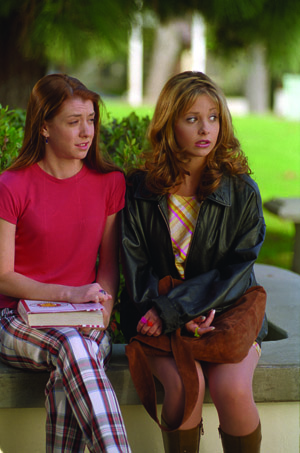Tellt Talk: Ladies first
Lately the thing that’s come to my attention and seems to be staying there the most is the Bechdel test. For those unfamiliar with it, the Bechdel test emerged in the mid 1980s from a comic strip and laid out three criteria for watching a film: 1. That it have at least two female characters with spoken lines. 2. That there is a scene in which they talk to each other. 3. For them to speak about a topic other than men. So… how many of my favourite TV shows, all emancipated and suchlike, can say that they pass the Bechdel test?

Well, I’m happy to say that as much as the huge array of Channel Five US crime smorgasbord are sometimes scoffed at by my high faluting friends, every one of them appears to pass the test. All they talk about is murder, assault, robbery and sometimes beer – and there is usually a female boss somewhere there in the mix too. Massive tick for the much maligned Tuesday night posse of CSI, The Mentalist and Body Of Proof. The jury may be out on Castle – the main female characters being his police partner, his mother and his daughter, making the world well and truly revolve around the former Firefly captain.
Speaking of which, sci-fi and fantasy seems to rate quite well on the Bechdel test, from the straw poll of programmes I can immediately think of.
“Barbarella and her ilk did very little for the women’s movement”
As much as Barbarella and her ilk did very little for the women’s movement, Zoe and Kaylee were much more likely to be discussing crank shafts than dating tips on board that old reprobate spaceship in Firefly. Equally, Gwen and Toshiko in Torchwood were more occupied with saving the world than grabbing a man, and that’s not to say that men didn’t catch their eye – or women. Just that they had a purpose other than plot devices and pretty arm candy.
Actually, there are some well rounded female characters who are good fun and powerful etc. This is where the test falls down. Where’s Jane Tennyson in Prime Suspect? In a man’s world, that’s where, surrounded by men without a woman in her corner and that’s the point of her story. Also, it does make every soap perfectly critically acceptable, as history’s Dot and Pauline nattering over the laundry is a set piece that will never waiver, even if it becomes the same conversation but had between Norris and Eileen. Domesticity is made up of more than a romantic couple and their romantic or embittered friends cooing and bitching over each other at every turn.
I think the thing is, just to be aware. Stories and plots can be well-written, revetting and progressive and yet still miss out. I’m racking my brain for a single moment in Doctor Who, one of my all time favourite shows, when as much as his ‘assistants’ are now ‘companions’ they talk to any other woman they meet about anything other than him for long.
Yes, the planet’s about to blow up, but does The Doctor really know what he’s doing? Yes, he does it’s alright. But then he is a character that prompts much curiosity. (Please don’t write in with examples, there must be some within the 50 years of the show’s existence, I’m just saying they don’t pop up all that often).
I’m excusing it. I’m giving it a reason. I’m used to it. If the plot’s good then it would be a shame to prise in extra irrelevant scenes just to pass an old test. I’d just like seeing varied female characters on my screen. Who knows, maybe next time a romcom female lead blows up her kitchen on her first date in a hilarious fashion, the electrician she calls might be a woman. And they might not even talk about the man she’s going to meet later. Maybe.
Follow me: latestvicky





















